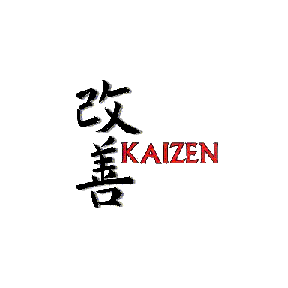 For some people, "organizational culture" calls to mind images of companies such as Google, with elaborate perks intended to lure the best talent and keep it there.
For some people, "organizational culture" calls to mind images of companies such as Google, with elaborate perks intended to lure the best talent and keep it there.
For others, it's the idea of an organization such as Zappos, which wants every employee to meet and keep lifelong friends at work.
For many Lean managers, the first company that comes to mind is Toyota, known for a kaizen culture so strong that death from overwork has become a problem.
The layperson often assumes Lean organizations are low on culture, because many popular definitions of organizational culture involve spending which would be considered wasteful by Lean managers.
Not so! Culture building is, in truth, critical to the success of Lean organizations, as demonstrated by Toyota.
Every organization wants a "culture of excellence," to the point that this oft-repeated jargon has become almost laughable. (more…)
 Stupid workplace rules—those senseless bureaucratic policies and red tape common to many organizations—are a hassle for everyone involved.
Stupid workplace rules—those senseless bureaucratic policies and red tape common to many organizations—are a hassle for everyone involved.
Managers don’t like having to enforce stupid workplace rules.
Employees resent having to obey them.
While some policies are non-negotiable, particularly those relating to workplace safety, it’s worth thinking about those rules that complicate the workplace, rather than enhance it.
In an article for Open Forum, contributor Bruna Martinuzzi asks, “What can you do to make sense of workplace rules? What are some rules that you should consider and what rules do you need to discard?”
Here are some suggestions:
The phrase "company culture" is often misunderstood. The problem is that people tend to view the desire for a great company culture as a touchy-feely component of business. A non-essential.
That's largely because a great company culture is intangible. It's not a product. It's not as easy to analyze as a profit and loss statement. Company culture isn't even as concrete as the office decor.
That said, building a great company culture is incredibly important. In fact, I would argue building and nurturing a great company culture is key to long-term success.
“If you want to build a company that attracts and retains loyal employees and customers, creating your own unique culture needs to be a top priority,” says Marla Tabaka, contributor to Inc. According to Tabaka, the online retailer Zappos exemplifies the power of a great company culture—and it's not just because they offer free employee lunches and a nap room.
In an Inc. article, Tabaka shares tips from Zappos and from Dr. David Vik’s latest book, “The Culture Secret: How to Empower People and Companies No Matter What you Sell.”
(more…)
